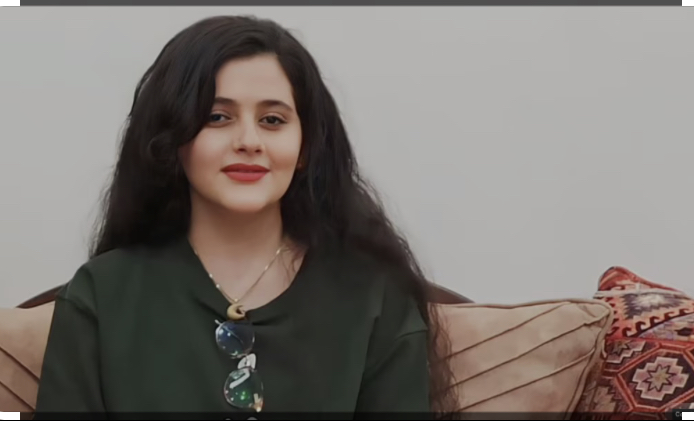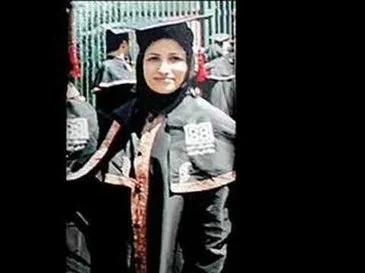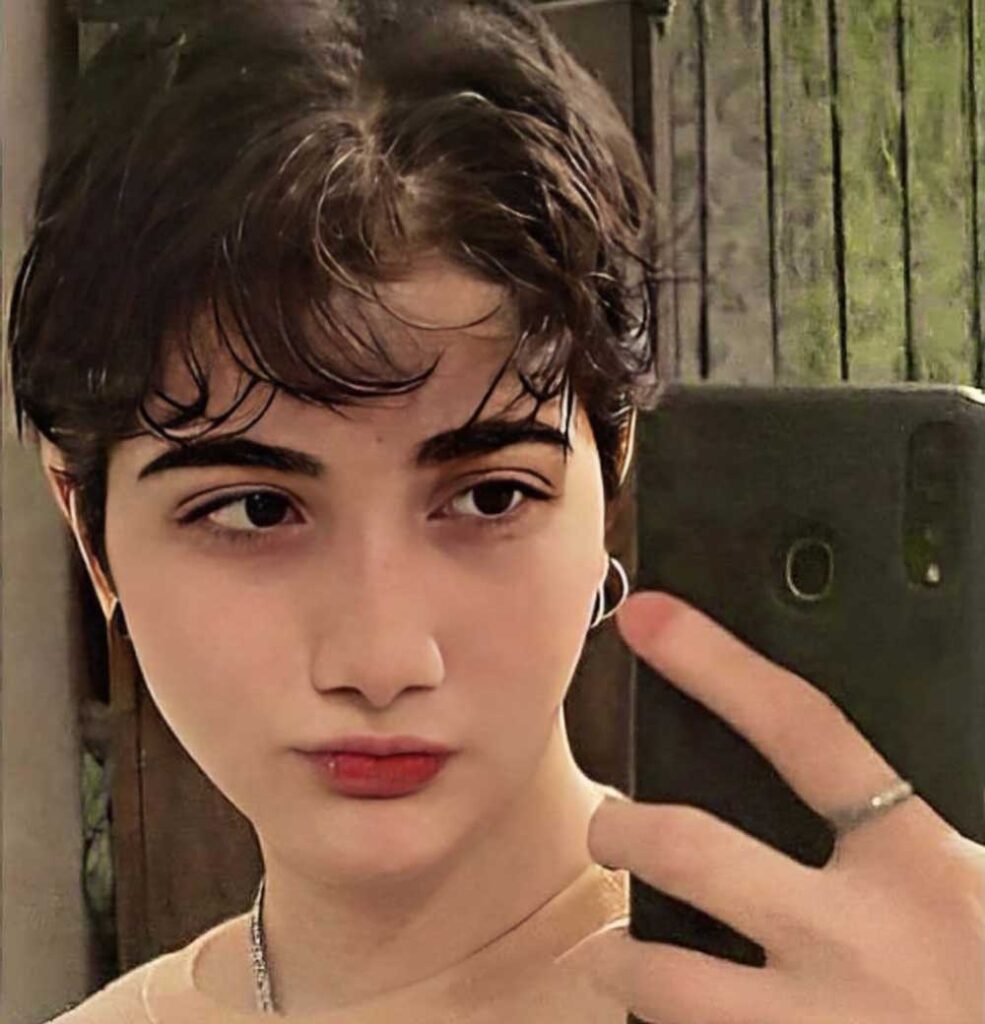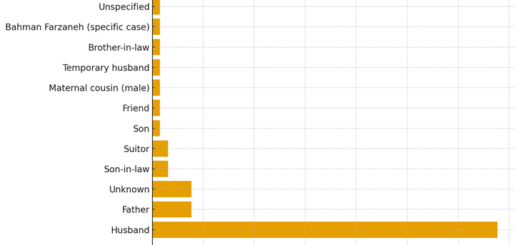Arezou Badri Was Shot by Police Due to Her Choice of Attire and Is Now Unable to Walk
Rezvan ,oghaddam
On July 23, 2024, a vague report from the Noor Police Commander was published
stating that “the occupants of a car disregarded a police order to stop, leading to a
shooting by law enforcement in accordance with the law on the use of weapons.” The
report did not mention who the occupants were.
Initial scattered reports indicated that the victim was a 31-year-old woman named
Arezou Badri. There was confusion regarding her identity, with some saying she was a
doctor from Khuzestan who was on vacation with her family in the north of Iran when
she became the target of the Mazandaran “Guidance Patrols” (morality police). The
incident reminded many of the Mahsa Amini death at the hands of the Guidance
Patrols. It later emerged that Arezou Badri, a mother of two, was born in Ardabil and
lived in Babolsar, Mazandaran Province, and that she was not a doctor. The photo
circulating on social media was also not hers.
Days passed without any verified information from Arezou’s family—no photos, protests,
or detailed explanations of what had happened to her.
On Saturday, August 10, the Mazandaran Provincial Police Command issued a
statement confirming that Arezou Badri was injured in a shooting by Noor County police
and was hospitalized. The statement mentioned that her car was a Pride 111, which was
stopped around 11 PM on July 22, 2024 “in accordance with the law on the use of
weapons.” As usual in such cases, law enforcement blamed the victim, claiming that
she attempted to “flee from the police.”

However, on Sunday, July 28, 2024, an informed source told Independent Persian News
that the only reason officers shot at Arezou Badri’s car, where she was with her friend
and two young children, was due to her “lack of hijab.” The source also stated that no
legal action had been taken against the officer who fired the shots.
According to the source, around 10 PM on Monday, July 22, 2024, Arezou and her
friend were returning to Babolsar from Noor. A police officer in a Samand car used a
loudspeaker to warn the two women to observe hijab, but they ignored the order and
continued on their way. A chase ensued, and an officer, without issuing any prior
warnings, bizarrely shot at their car. One of the bullets pierced the passenger side and
lodged in Arezou’s back.
The source continued that the officers physically attacked the two women to arrest
them. However, upon seeing Arezou’s severe condition and heavy bleeding, they
panicked and called an ambulance. Arezou was first taken to Noor Hospital and then
transferred to Khomeini Hospital in Sari. According to medical specialists, the bullet hit
her spinal canal, and there is a high probability that she will permanently lose her ability
to walk.
Arezou was eventually transferred to a hospital in Tehran under heavy security
measures, where she underwent surgery to remove the bullet from her back. Although
the bullet was removed after about 10 days, her lungs and spinal cord suffered serious
damage.
After about a week, Mrs. Badri was transferred to Tehran to have the bullet removed
from her body. She was placed under strict security measures in the ICU at Vali-Asr
Hospital in Tehran. Approximately 10 days after accident, doctors successfully removed
the bullet from Arezou Badri’s back, but her lung and spinal cord had suffered “serious
damage.”
Since the news broke about Arezou being shot due to her refusal to comply with
mandatory hijab, many security forces have been deployed to Khomeini Hospital in Sari
to prevent any information about her condition from being leaked or any photos from
being taken. The officers even confiscated Arezou and her friend’s phones and
deactivated her Instagram account to prevent any images from being shared with the
media.
Arezou Badri is currently under strict security, with her family allowed only brief visits
after their phones are confiscated. No one is permitted to take pictures or videos of her.
People have not forgotten Mahsa Amini, the 19-year-old girl who traveled to Tehran for
a few days but was arrested by the Guidance Patrol for not wearing her hijab. She
suffered skull fractures and brain death due to beatings by patrol officers and the Moral
Security Police of the Islamic Republic of Iran and died in Tehran’s Kasra Hospital three
days later, on September 16, 2022.

Similarly, Zahra Bani Yaghoub, a young doctor serving in Hamedan, died in 2007 in the
detention of the headquarters of commanding good and forbidding evil in Hamedan city
just a few hours after being arrested. The Iranian authorities claimed that she committed
suicide in custody.

Armita Geravand, a 17-year-old girl, fell into a coma after suffering a brain hemorrhage
following an argument with hijab enforcers in Tehran’s subway on October 1, 2023, and
died 28 days later.

The right to choose one’s clothing is a fundamental human right, allowing individuals to
decide freely about their appearance. Rejecting compulsory hijab is part of this right and
represents resistance against restrictions imposed on personal freedoms. When hijab is
enforced, it becomes a tool for control and oppression, stripping away personal choice.
In a society with respects individual rights and basic freedoms, everyone should be able
to choose their attire without fear of pressure or punishment and live in a free and equal
environment.
For 46 years, this basic right has been denied to Iranian women, and countless lives
have been lost because of it.
The Guidance Patrols (morality police) are a symbol of systematic repression and social
control over women in Iran, enforcing mandatory hijab and monitoring women’s
behavior and attire. These forces use violence, threats, and humiliation to impose state
standards on women’s dress and conduct, violating basic human rights and individual
freedom of choice. The brutal and degrading actions of these patrols not only limit
women’s freedoms but also create an atmosphere of fear and fuel widespread
discontent and protests. Women’s resistance against these patrols symbolizes the fight
against oppression and the defense of freedom and human dignity.
The struggle against compulsory hijab is, in fact, a fight to preserve human dignity,
respect for cultural and social diversity, and the creation of a society where everyone is
free to live according to their personal beliefs and desires. This struggle is also a protest
against authoritarian structures that violate human rights and suppress fundamental
freedoms.
Follow news in the Stop honor Killings Campaign Telegram group:
https://t.me/stophonorkilling
Stop honor Killings Campaign


















